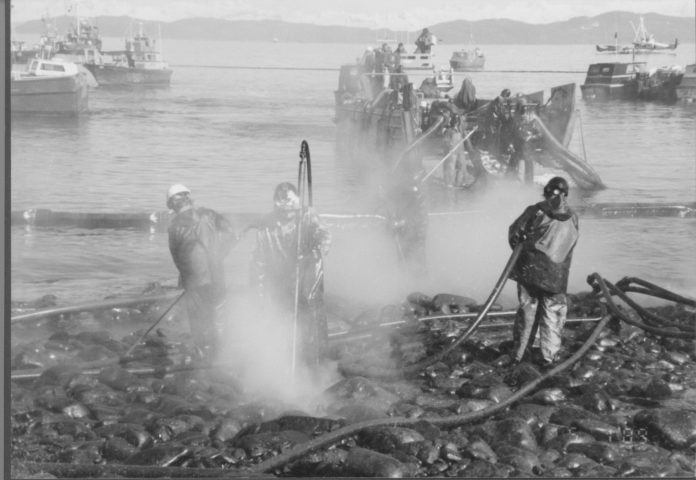
By Kyi Gasmen
This weekend marks the 35th anniversary of the Exxon Valdez oil spill. According to NOAA, Alaska’s environment has exhibited “significant physical and biological changes” in the years subsequent to the spill. As listed by NOAA’s Office of Response and Restoration, these changes include warming oceans, receding ice, and the decline of fish and mammal populations.
Despite the three-plus decades that have passed, the Exxon Valdez oil spill continues to contaminate the daily lives of Alaskans. The following discusses how students at Cordova Junior-Senior High School have been educated about the spill, their views, and how the disaster affected their opinions on climate change.
Cordova Jr./Sr. High School students are educated about the oil spill briefly in the school system, but the majority of their knowledge stems from contacts with people they know who were present during the event in 1989, as well as programs outside of school.
CHS senior Anika Jensen states her grandfather, great-uncle, and father – Rodrick Jensen – responded to the spill. Her father, recalling the event, said “[It was] such an irresponsible act… to run a laden tanker around on a known reef.”
He continues to say the spill resulted “in hundreds of oiled birds, otters, and seals,” including “millions of individual fish, invertebrates, and other sea creatures all part of a diverse and intricate ecosystem.”
Junior Samaya Faber’s fishing family was also present during the disaster. Her grandfather, John Thomas, says he was one of the first boats to respond and remembers the “fear and dread” he felt when flying over the Valdez arm with a pilot. Faber’s aunt, Gwynn Thomas, recalls boarding fishing boats “desperately trying to make a dent in the millions of gallons of crude oil that had seeped into the ocean.”
Faber and another student, sophomore Morgan Saiget, add that participating in the Copper River Stewardship Program contributed greatly to their education about the disaster.
Regarding climate change, most students have said the spill established or affirmed their opinions on the oil industry and its effects on our environment. Saiget says that she now holds a “better understanding of the risks associated with oil.”
“The reward may not be worth the cost… The Exxon Valdez Oil Spill wrecked so many lives,” she said. Saiget cited the animals who were harmed, the jobs that were affected, and the environment that was destroyed.
Faber follows Saiget’s views, saying that “a necessary step in the journey to a healthier world” is a “movement away from the use of crude oil.” She acknowledges the dependency the U.S. has established on crude oil, but continues to say the country’s dependency has “made us more at risk for disasters,” directly referencing the Exxon Valdez Oil Spill.
When asked how they think their generation views the legacy of the Exxon spill, Saiget said, “We are aware of how badly another similar situation could end, and we have enough connection to our environment to care.”














